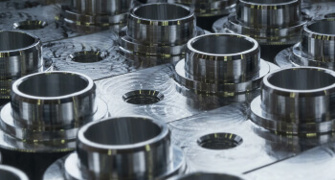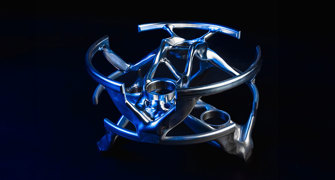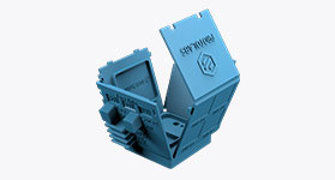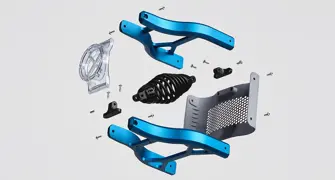Talk with Our Team
Hello! We just need a few bits of information, and then a manufacturing expert will reach out to you directly to see how we can partner on a future production project.
Thank you! We've received your request and a member of our team will reach out shortly.

Online Injection Moulding Service for Custom Parts
Digital manufacturing for plastic injection moulding prototypes and on-demand production parts in as fast as 1 day. Request an instant quote online today.
shield_locked All Uploads are Secure and Confidential
Injection Moulding Processes
|
At Protolabs we offer plastic injection moulding, liquid silicone rubber (LSR) moulding, overmoulding, insert moulding, prototyping and on-demand manufacturing to ISO 9001 quality standards. Make the move from prototyping to on-demand manufacturing for affordable, high-quality moulded parts within days, with a free prototyping tool when you switch. |
Plastic Injection Moulding

Plastic injection moulding is a manufacturing process where resin in a barrel is heated to a molten state, then shot into a mould to form a final production-grade thermoplastic part.
Lead Time: 1-15 Working Days
Liquid Silicone Rubber Moulding

Liquid silicone rubber moulding is a thermoset process that mixes a two-component compound together, which is then heat cured in the mould with a platinum catalyst to produce a final part.
Lead Time: 1-15 Working Days
Overmoulding & Insert Moulding

Overmoulding and insert moulding are two-part injection moulding processes where one material is overlaid onto a second substrate part or metal insert to create a single component.
Lead Time: 1-15 Working Days
Additional Capabilities for Injection Molding Orders
Prototyping and On-demand Production

We provide two injection moulding service options. One is best suited for those who need smaller part quantities often associated with prototyping and the other is a good fit for those who require larger part quantities, and is available on-demand with our low-volume production.
Injection Moulding Finishing

At Protolabs, we provide a wide selection of post-process options for injection moulding, including threaded inserts, pad printing, laser engraving, basic assembly, and inspection reports.
Quality Control and Standards

We use advanced moulding techniques with a focus on critical dimensions through our automated CMM process. Every order includes comprehensive manufacturing analysis, design consulting, and quality reports like FAIs and capability reports.
Our Injection Moulding Facility
Want a peek behind the curtain of our injection moulding process? Take a virtual tour. We offer a fully digitised injection moulding process to bring you cost-efficient parts fast. From design upload to quoting, from part production to shipping, it’s injection moulding tailored to fit your needs, every step of the way.
Injection Mould Tooling Options and Quality Reporting
|
We offer two services for any stage of your product lifecycle. Our prototype injection moulding speeds up development and provides parts in days. On-demand Manufacturing meets production needs, allowing quick part qualification with scientific moulding, in-process CMM inspections with GD&T, and comprehensive secondary operations. |
| Prototyping | On-Demand Manufacturing | |
|---|---|---|
| Objective |
I need to validate my design at Protolabs speeds. I need the flexibility to economically iterate before production. |
I have on-demand production needs at Protolabs speeds. |
| Best When |
|
|
| Mould Price | Lower | Higher |
| Part Price | Higher | Lower |
| Mould Cavities | Single | Single and multi-cavity |
| Mould Life | Limited (guaranteed for at least 2,000 shots) | Unlimited |
| Mould Storage | Stored for 18 months of inactivity | Stored for 3 years of inactivity |
| Mould Ownership | Upon request | Yes |
| Quality Documentation | Basic inspection reports available upon request |
|
| Shared Features |
Aluminium moulds |
|
| Details | ||
Sample Quote
Not sure which manufacturing service is right for your project? You can get quotes for both to compare. Alternatively, contact one of our representatives on +44 (0) 1952 683047 to chat about your requirements.
Injection Molding Materials
|
|
|
- Standard silicone (30, 40, 50, 60, and 70 durometers)
- Medical-grade silicone
- Optical-grade silicone
- Fluorosilicone (fuel and oil resistant)
We have wide selection of more than 100 thermoplastic and thermoset materials. And if you're looking for alternative material options, check out our guide to resin substitutes for ABS, PC, PP, and other commonly molded plastics.
What are the benefits of Injection Moulding at Protolabs?
What are the advantages of Injection Moulding?
expand_less expand_moreInjection moulding is plastic manufacturing process that can produce high quality parts at scale. It's typically used for low- to high-volume production but our aluminium tooling can also make prototyping runs economical.
- Low cost at higher volumes
- Exceptional part cosmetics and surface finish
- Repeatable
- Complex parts
- Low scrap rate
- Large selection of thermoplastic and thermoset materials
What are the applications of injection moulding?
expand_less expand_moreInjection moulding is widely used for plastic part production in medical, consumer, and automotive industries. Typical parts include:
- Housings
- Brackets
- Gears
- Single-use medical parts
- Electrical connectors
- Syringes
- Containers
How much does injection moulding cost?
expand_less expand_moreOur moulds start from £995, however, because of the initial capital investment in tooling, injection moulding makes sense for higher volumes of parts. Our mould costs will vary depending on part geometry and complexity. Other factors that will impact injection moulding cost are lead times and material.
To find out how much your part will cost, upload your CAD model to get a free quote.
Do you do production moulding?
expand_less expand_moreYes, we offer a production tooling option called on-demand manufacturing. This tooling option provides several benefits: lower piece part price, multi-cavity capabilities, guaranteed tooling for the life of the project (we will cut a new tool if it wears out), and first article inspections.
What are your tolerances for moulded parts?
expand_less expand_moreIn most cases, we can maintain a machining tolerance of +/- 0.08mm with an included resin tolerance that can be greater than but no less than +/- 0.002mm/mm.
What are the differences between prototype and production moulds
expand_less expand_moreInjection Moulding:
- Involves injecting plastic into a mould, making it ideal for high-volume production due to low costs per part.
- Has a longer setup time for the mould but fast production afterward.
- Offers a wide range of plastic materials with high-quality finish and precise tolerances.
3D Printing (Additive Manufacturing):
- Builds parts layer by layer from a digital model, without the need for moulds.
- Best for low-volume, custom, or prototype parts as costs are higher per part.
- Faster initial production but slower for large quantities, with diverse materials and varying finish quality.
What are the differences between prototype and production moulds?
expand_less expand_morePrototype Moulds:
- For testing and small runs
- Made from aluminum
- Cheaper and quicker to produce
- Easily modified
Production Moulds:
- For large-scale manufacturing
- Made from hardened steel
- Very durable and precise
- Higher cost and longer lead time
Can you use aluminium tools for mass-volume production?
expand_less expand_moreIf you use Protolabs for On Demand Manufacturing, we give you a lifetime guarantee for the moulds so you can use them for mass-volume production. There are high-volume applications where it is better to choose our ODM offer using aerospace-grade aluminium tooling and others where it makes more sense to opt for steel moulds – speak to our application engineers for advice.
Will aluminium tools last as long as steel tools?
expand_less expand_moreIf you use Protolabs for On Demand Manufacturing, we give you a lifetime guarantee for the moulds so you can use them for mass-volume production. There are high-volume applications where it is better to choose our ODM offer using aerospace-grade aluminium tooling and others where it makes more sense to opt for steel moulds – speak to our application engineers for advice.
Does it take a long time to produce injection moulding tools?
expand_less expand_moreWhile steel moulds typically take 10-12 weeks to produce, and you may need to wait even longer if they are being shipped from across the world, the same is not true if you use Protolabs tooling. At Protolabs, it takes us between 1 to 15 days to produce moulds.
What is the maximum part size for injection moulding?
expand_less expand_moreThe largest size we can support with plastic injection moulding is 480mm x 980mm with a depth of 101mm from parting line with 3° of draft, up to 280mm of the part. With a volume of 966,837 mm³ and a projected mould area of 112903 mm²
What materials are available for injection moulding?
expand_less expand_moreInjection Molding Materials
We have wide selection of more than 100 thermoplastic and thermoset materials. And if you're looking for alternative material options, check out our guide to resin substitutes for ABS, PC, PP, and other commonly moulded plastics.
Thermoplastics
- ABS
- ABS/PC
- Acetal
- Acetal Copolymer
- Acetal Homopolymer/Delrin
- HDPE
- LDPE
- Nylon
- PBT
- PEEK
- PEI
- PMMA (Acrylic, Plexiglas)
- Polycarbonate
- Polypropylene
- PS
- PPS
- TPC-ET
- TPE
- TPU
- TPV
Thermosets
- Standard Silicone (30,50,60 and 70 durometers)
- Dow Corning MS-1002 Clear
- Dow Corning MS-4002 Optical Clear
What is the difference between plastic injection moulding and LSR (Liquid Silicone Rubber) moulding?
expand_less expand_morePlastic Injection Moulding:
- Uses thermoplastics that melt and cool to set.
- Suitable for diverse products like automotive parts and consumer goods.
- Offers various plastics like ABS and nylon.
LSR (Liquid Silicone Rubber) Moulding:
- Uses liquid silicone that cures with heat.
- Ideal for medical devices and flexible products.
- Provides flexibility and high temperature resistance.
What's in an Online Injection Moulding Quote?
We do quoting a little differently. When you request an injection moulding quote, you'll not only receive accurate pricing, but also a manufacturing analysis—within just a few hours. Our online quoting platform also provides you with gate and ejector pin layouts and a price curve tool to help select the best tooling option for your project.
Get a Quote





















